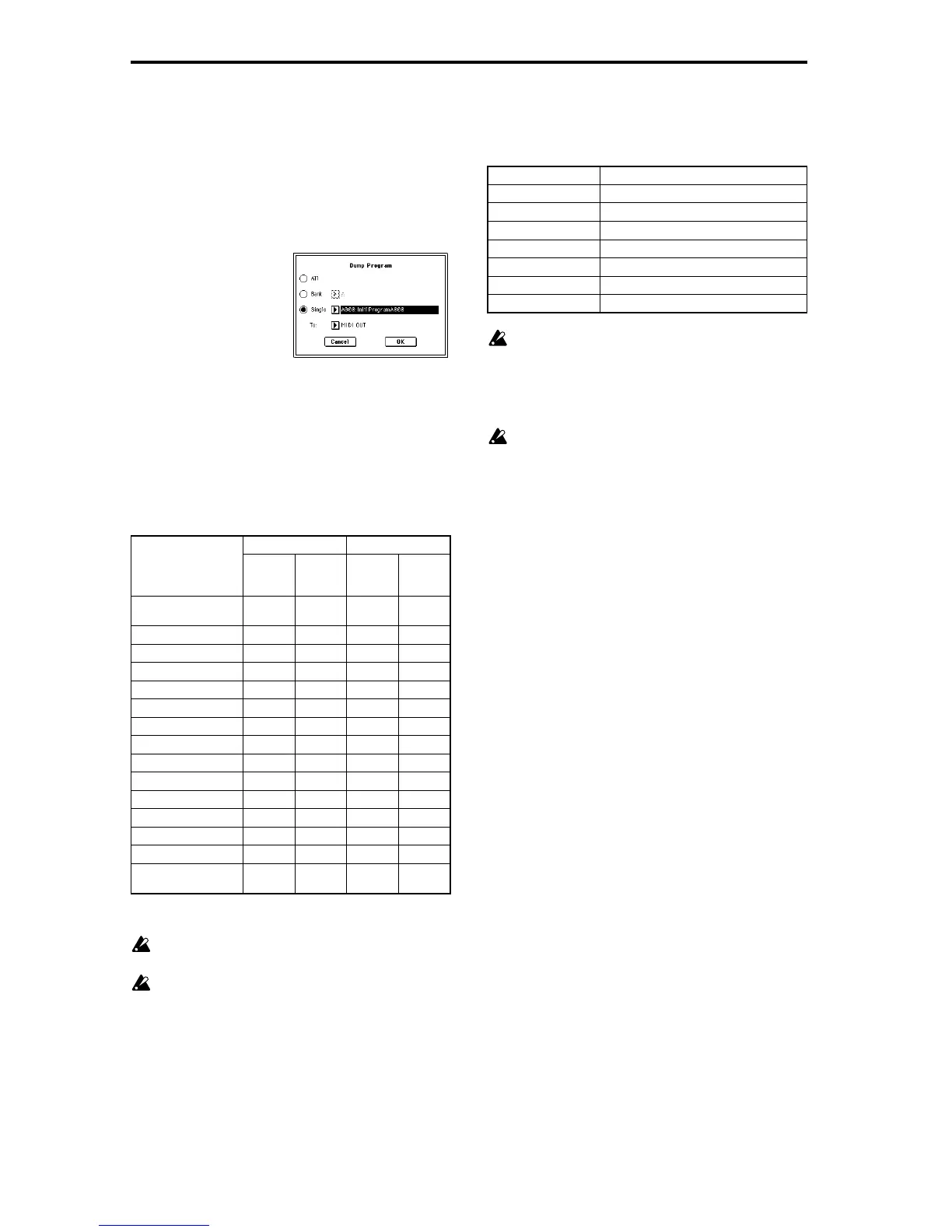120
If you are using a MIDI data filter etc., connect the TRI-
TON’s MIDI OUT connector to the MIDI IN connector of
the MIDI data filter (refer to p.111, 112 in the Basic Guide).
2 Select Global P1: MIDI.
3 From the page menu commands, select the type of data
that you wish to dump. The following illustration shows
the dialog box that will appear when “Dump Program”
is selected. If you wish to dump all programs, select
“All.” To dump one bank select “Bank,” or to dump one
program select “Single.”
4 In “To,” specify the output connector from which the
data will be transmitted.
MIDI OUT: the rear panel MIDI OUT connector
PC I/F: the rear panel TO HOST connector
5 Press the OK button to transmit the data. While the data
is being transmitted, the display will indicate “Now
Transmitting MIDI Data.”
The size of the data and the time required for transmis-
sion will depend on the type of data.
The following table shows the size of each data dump, and
the time required.
Reception
Do not touch the TRITON’s switches or turn off the
power while data is being received.
After a data dump is received, the TRITON will require
up to 16 seconds to process the data and write it into
memory. During this time, the display will indicate
“Now writing into internal memory.” While this dis-
play is shown, you must under no circumstances turn
off the power of the TRITON. If the power is turned off
during this time, the TRITON may fail to operate cor-
rectly when the power is turned on again. If this occurs,
hold down the [MENU] key and the [9] key while you
turn on the power. However when this is done, the con-
tents of memory will be initialized.
Transmission and reception of MIDI data is also impos-
sible during this time. When receiving multiple data
dumps in succession, you must allow an interval
between the transmission of each data dump.
When you save data dumps from the TRITON to a
MIDI data filer, do not save multiple data dumps
together. If two or more data dumps are saved together,
the TRITON will not have enough time to write the first
data dump before the next data dump is received, and
it will not be possible to receive all of the data.
While the TRITON is writing the data into memory,
transmission of Active Sensing (FEh) messages from the
MIDI OUT connector and TO HOST connector will
stop.
Data dump reception procedure
1 Connect the TRITON and the device that will receive the
data dump.
If you are using a computer that is able to transmit MIDI
exclusive messages, connect the serial port of the com-
puter to the TO HOST connector of the TRITON.
If you are using a MIDI data filer, connect the MIDI OUT
connector of the data filer to the MIDI IN connector of the
TRITON (refer to p.111, 112 in the Basic Guide).
2 Set the MIDI channel of the MIDI device to match the
global MIDI channel “MIDI Channel” (1–1a) of the TRI-
TON. If you want the TRITON to receive data that was
previously transmitted to a MIDI device, you must set
the global MIDI channel of the TRITON to the same glo-
bal MIDI channel that was used when the data was trans-
mitted.
To set the MIDI channel of the transmitting device, refer
to the owner’s manual for that device. The global MIDI
channel of the TRITON is set by “MIDI Channel.”
3 Either check “Enable Exclusive” (1–1b), or display one of
the page menu commands of this page. When one of
these page menu commands is displayed, data dumps
can be received regardless of the “Enable Exclusive” (1–
1b) setting.
4 Transmit the data from the other device. For the proce-
dure, refer to the owner’s manual for the device you are
using.
Type of data dumped Data size (kByte) Time required (Sec)
TRITON EXB-
MOSS is
installed
TRITON EXB-
MOSS is
installed
Data All
922.7–
2122.7
991.8–
2191.8
295.3–
679.25
317.4–
701.4
Program All 345.6 414.7 110.6 132.7
Program Bank (A/B/C/D/E) 691.2 --- 22.1 ---
Program Bank (F) --- 691.2 --- 22.1
Program Single (A/B/C/D/E) 0.5 --- 0.2 ---
Program Single (F) --- 0.5 --- 0.2
Combination All 229.4 ← 73.4 ←
Combination Bank 57.3 ← 18.4 ←
Combination Single 0.4 ← 0.2 ←
Drum Kit All 263.2 ← 84.2 ←
Drum Kit Single 4.1 ← 1.3 ←
Arpeggio Pattern All 74.2 ← 23.8 ←
Arpeggio Pattern Single 0.3 ← 0.1 ←
Global Setting 0.8 ← 0.3 ←
Sequencer Data 4.0–
1204.0
← 3.0–
387.0
←
Type of data dumped Processing time for writing into memory
All Approximately 16 seconds
All Programs Approximately 8 seconds
All Combinations Approximately 4 seconds
All Drum Kits Approximately 8 seconds
All Arpeggio Patterns Approximately 4 seconds
Global Setting Approximately 4 seconds
Sequencer Approximately 1 second

